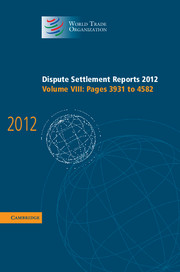Book contents
- Frontmatter
- Contents
- China — Measures Related to the Exportation of Various Raw Materials (WT/DS394, WT/DS395, WT/DS398)
- PHILIPPINES - TAXES ON DISTILLED SPIRITS
- TABLE OF CONTENTS
- CASES CITED IN THESE REPORTS
- LIST OF ABBREVIATIONS USED IN THESE REPORTS
- 1 INTRODUCTION
- II ARGUMENTS OF THE PARTICIPANTS AND THE THIRD PARTICIPANTS
- III ISSUES RAISED IN THIS APPEAL
- IV BACKGROUND
- V ARTICLE III:2, FIRST SENTENCE, OF THE GATT 1994
- VI ARTICLE III:2, SECOND SENTENCE, OF THE GATT 1994
- VII FINDINGS AND CONCLUSIONS IN THE APPELLATE BODY REPORT WT/DS396/AB/R
- VIII FINDINGS AND CONCLUSIONS IN THE APPELLATE BODY REPORT WT/DS403/AB/R
- ANNEX I NOTIFICATION OF AN APPEAL BY THE PHILIPPINES, WT/DS396/7, WT/DS403/7
- ANNEX II NOTIFICATION OF AN OTHER APPEAL BY THE EUROPEAN UNION, WT/DS396/8, WT/DS403/8
- PHILIPPINES - TAXES ON DISTILLED SPIRITS
- Cumulative List of Published Disputes
VI - ARTICLE III:2, SECOND SENTENCE, OF THE GATT 1994
from PHILIPPINES - TAXES ON DISTILLED SPIRITS
Published online by Cambridge University Press: 13 December 2017
- Frontmatter
- Contents
- China — Measures Related to the Exportation of Various Raw Materials (WT/DS394, WT/DS395, WT/DS398)
- PHILIPPINES - TAXES ON DISTILLED SPIRITS
- TABLE OF CONTENTS
- CASES CITED IN THESE REPORTS
- LIST OF ABBREVIATIONS USED IN THESE REPORTS
- 1 INTRODUCTION
- II ARGUMENTS OF THE PARTICIPANTS AND THE THIRD PARTICIPANTS
- III ISSUES RAISED IN THIS APPEAL
- IV BACKGROUND
- V ARTICLE III:2, FIRST SENTENCE, OF THE GATT 1994
- VI ARTICLE III:2, SECOND SENTENCE, OF THE GATT 1994
- VII FINDINGS AND CONCLUSIONS IN THE APPELLATE BODY REPORT WT/DS396/AB/R
- VIII FINDINGS AND CONCLUSIONS IN THE APPELLATE BODY REPORT WT/DS403/AB/R
- ANNEX I NOTIFICATION OF AN APPEAL BY THE PHILIPPINES, WT/DS396/7, WT/DS403/7
- ANNEX II NOTIFICATION OF AN OTHER APPEAL BY THE EUROPEAN UNION, WT/DS396/8, WT/DS403/8
- PHILIPPINES - TAXES ON DISTILLED SPIRITS
- Cumulative List of Published Disputes
Summary
184. In this section, we address both the Philippines' appeal and the European Union's other appeal regarding Article III:2, second sentence, of the GATT 1994. We begin with the other appeal of the European Union.
European Union's Other Appeal
185. The European Union claims that the Panel erred in characterizing its claim under Article III:2, second sentence, of the GATT 1994 as made in the “alternative”290 to its claim under the first sentence of Article III:2. According to the European Union, by failing to address its claim under Article III:2, second sentence, the Panel acted inconsistently with Articles 7.1, 7.2, and 11 of the DSU. Moreover, to the extent that the Panel's failure to address the European Union's claim under Article III:2, second sentence, constituted application of the principle of judicial economy, the European Union submits that the Panel exercised “false” judicial economy in violation of Articles 3.7 and 21.1 of the DSU. The European Union requests the Appellate Body: to reverse the Panel's characterization of its claim under the second sentence of Article III:2 as “alternative” to its claim under the first sentence thereof; to complete the legal analysis; and to find that the Philippines has acted inconsistently with Article III:2, second sentence, of the GATT 1994.
186. The Philippines does not contest the specific claim raised by the European Union in its other appeal.
- Type
- Chapter
- Information
- Dispute Settlement Reports 2012 , pp. 4232 - 4260Publisher: Cambridge University PressPrint publication year: 2014



